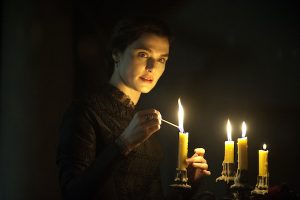by Brian T. Carney for Washington Blade

Actor Rachel Weisz did not do a lot of preparation for her dazzling star turn in the new movie “My Cousin Rachel,” based on the novel by Daphne du Maurier.
“I read the script and I learned to ride side saddle and that was about it in terms of active research,” she says. “The rest is just imagining.”
But she did have to decide if her character, Rachel Sangalletti Ashley, was guilty or innocent. Rachel is suspected of poisoning her late husband Ambrose Ashley, and of seducing and poisoning his innocent young heir Philip (Sam Claflin).
“When I first read the script,” Weisz says, “I didn’t know. It was open to interpretation, but I had to made a decision before I actually played her.”
When shooting started, director Roger Michell (who also adapted the screenplay) had a request of Weisz. “Roger asked that I keep my decision a secret from him. He still doesn’t know.” And it’s going to stay that way. “It’s a secret still,” she says. “I’ll take it to the grave.”
As is often the case in works by du Maurier, issues of gender and sexuality and sexual mores subtly underscore the action. Weisz points out that, “du Maurier is playing with feminism and a woman not feeling that she needs to be married in order to have sexual pleasure, and also feeling that being married would mean that she would be owned. Rachel wants to be independent and free and carve out her own sense of self and her own sense of sexuality which was very radical for the 1850s and unfortunately may be still radical in some places.”
Weisz also mentions that some of the sexual energy of the novel may come from du Maurier’s own life and her passion for Ellen Doubleday, the wife of her American publisher Nelson Doubleday.
“It’s obviously a woman writing about a man in love with a woman, but apparently she was actually writing about her own obsession with her publisher’s wife,” Weisz says. “I don’t know much more about the story than that, but that’s there in the history of the writing of the novel, which I think is an interesting biographical detail.”
Weisz also credits the sumptuous period costumes by Dinah Collin for helping her understand the complex sexual mores of the era. “Wearing a corset is quite intense,” the actor explains. “You can’t breathe. There’s a certain oppression that is expressed through the clothes. You can’t put it on yourself; someone has to lace you in. So it takes time and once you’re in it, you’re very restrained and it immediately makes you more formal, more poised. It’s like a cage of femininity strapped on to you. … There’s great beauty in them as well.”
Michell also emphasized Rachel’s rebellion against period sexual mores by contrasting her with Louise Kendall, Philip’s devoted childhood friend and model of 1850’s femininity (played by Holliday Grainger in a breakout performance). Weisz says she had no idea that Michell was setting them up as rivals. “When I saw the finished film a few days ago, I suddenly thought, oh my God, is Roger suggesting that there’s a possibility that Louise was the bad guy? Had she plotted against Rachel to get what she wanted? That was an insinuation from that last frame of the movie.”
It should be noted that the final scenes of the movie go beyond the ending of the du Maurier novel. A spoiler follows.
“It’s very interesting that both women are under suspicion,” Weisz says, “obviously me more than her, but her too. But, at the end, she’s alive, she’s got him, and children. I’m off the market in a big way.”
Weisz’s next project will also be of interest to LGBT viewers.
“I just produced and starred in a film called ‘Disobedience’ which is an adaptation of a Naomi Alderman novel. I optioned the novel and sought out the director and found the financing and we made it at the beginning of this year in London,” she says. “It’s a love story between two women set in the Orthodox Jewish community of North London. It’s in post-production right now.”
The film is slated for release later this year.
Original article can be found here.

















